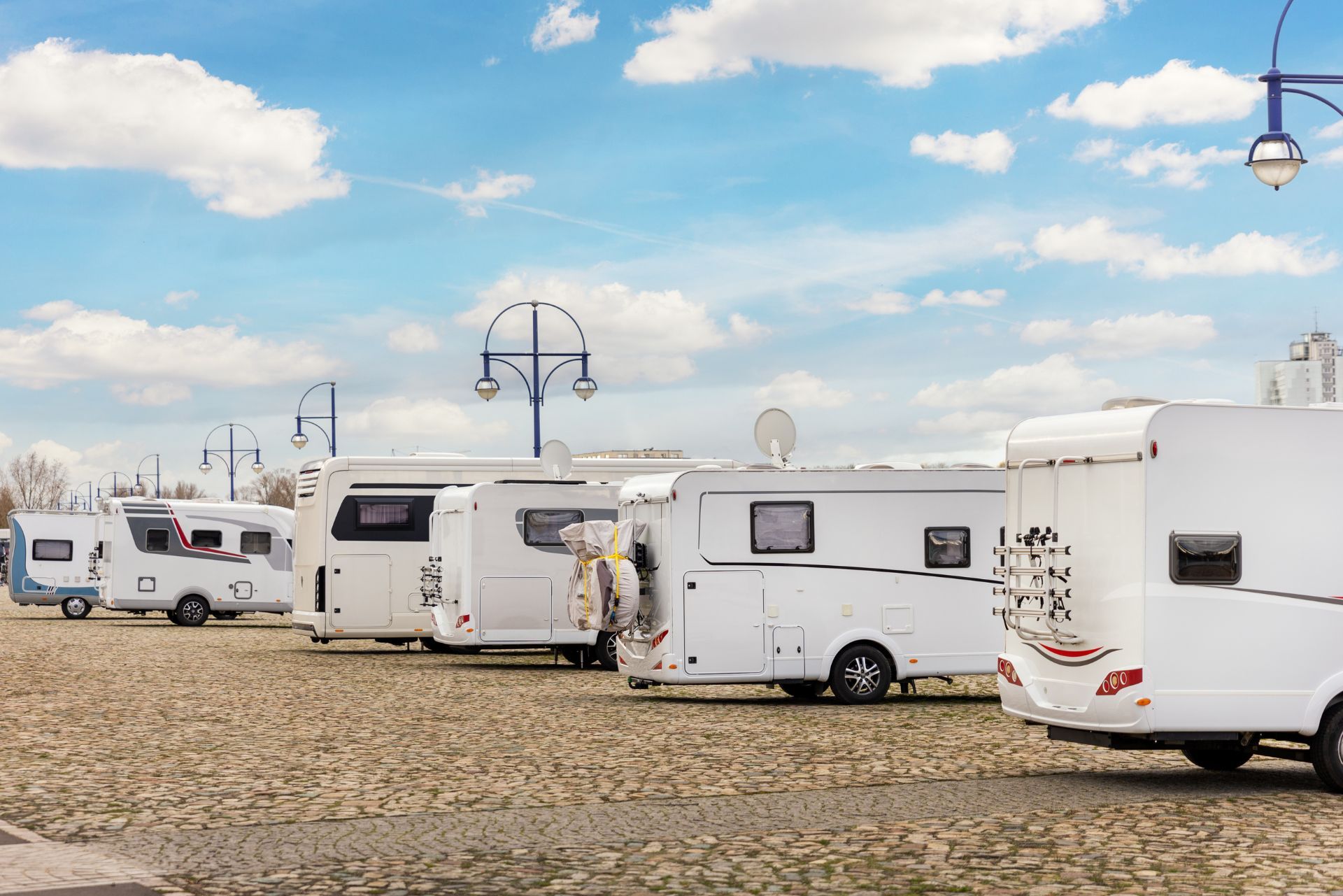California Motorhome Dealership Insurance

9:00am - 6:00pm Mon-Fri
Will Reply in 15min*
Top 3 Recommended Policies
Index
Understanding the Risks Faced by California Motorhome Dealerships
Impact of California’s Advanced Clean Truck Regulations on Motorhome Dealerships
Insurance Market Dynamics and Competitive Landscape
Managing Claims and Mitigating Losses
Key Considerations When Choosing Motorhome Dealership Insurance
Looking Ahead: Preparing for the Future of Motorhome Dealership Insurance in California
Operating a motorhome dealership in California comes with a unique set of challenges, especially when it comes to insurance. From navigating complex regulatory landscapes to managing a wide array of risks, dealership owners must be well-informed to protect their businesses effectively. This comprehensive guide explores everything you need to know about California motorhome dealership insurance, including risk management, regulatory impacts, market dynamics, and expert insights to help you make informed decisions.
Understanding the Risks Faced by California Motorhome Dealerships
Motorhome dealerships in California confront a broad spectrum of risks that can impact their operations and profitability. According to KPA, these dealerships face over 100 distinct risks, ranging from Environmental Health and Safety (EHS) hazards to Human Resources concerns and Sales & Finance issues. This complexity requires a tailored insurance strategy that addresses the multifaceted nature of dealership operations.
Environmental risks, such as chemical spills or waste management, are particularly critical in California due to stringent state regulations. Additionally, human resources challenges, including employee safety and labor compliance, add another layer of potential liability. Sales and finance risks, such as credit defaults or fraud, further complicate the insurance landscape.
Given this extensive risk environment, it’s essential for dealership owners to regularly evaluate their insurance policies and risk management strategies. Tom Kline, founder of Better Vantage Point, compares this process to a “doctor’s annual checkup,” emphasizing the importance of finding the right risk strategy tailored to each dealership’s unique circumstances (rvnews.com).
Moreover, the financial implications of these risks can be significant, affecting not only the bottom line but also the long-term viability of the dealership. For instance, a single incident of non-compliance with environmental regulations could lead to hefty fines and costly remediation efforts. Additionally, the potential for lawsuits stemming from employee injuries or customer disputes can strain resources and divert attention from core business activities. Dealerships must also consider the impact of market fluctuations, which can affect sales and inventory management, further complicating their risk profiles.
In light of these challenges, many dealerships are turning to comprehensive training programs for their staff, focusing on safety protocols and compliance measures. By investing in employee education, dealerships can foster a culture of safety and accountability, which not only mitigates risks but also enhances overall operational efficiency. Furthermore, leveraging technology, such as risk management software and data analytics, can provide valuable insights into potential vulnerabilities, enabling dealerships to proactively address issues before they escalate into more significant problems.

Impact of California’s Advanced Clean Truck Regulations on Motorhome Dealerships
One of the most significant recent developments affecting motorhome dealerships in California is the state's Advanced Clean Truck (ACT) regulations. These rules require manufacturers of medium and heavy-duty vehicles, including motorhomes, to progressively increase the percentage of zero-emission vehicles (ZEVs) they sell each year.
This regulatory shift has profound implications for dealerships, as it influences inventory, sales strategies, and insurance considerations. While the ACT regulations do not outright ban diesel RV sales, they create a market environment that encourages the adoption of cleaner technologies (California Air Resources Board).
Dealerships must adapt to these changes by preparing for a gradual transition in their product offerings. This transition may affect insurance policies, as zero-emission vehicles could present different risk profiles compared to traditional diesel motorhomes. Understanding these nuances is crucial for dealerships to maintain adequate coverage while complying with evolving regulations.
Moreover, the shift towards zero-emission vehicles is not just a regulatory challenge; it also presents an opportunity for dealerships to innovate and differentiate themselves in a competitive market. By investing in training for sales staff on the benefits and features of electric motorhomes, dealerships can enhance customer engagement and build trust with environmentally conscious consumers. Additionally, partnerships with manufacturers who are leading the charge in electric RV technology can position dealerships as forward-thinking leaders in the industry.
Furthermore, the ACT regulations may catalyze a broader transformation in the RV lifestyle itself. As more consumers become aware of the environmental impact of their travel choices, there is potential for a shift in consumer preferences towards sustainable travel options. Dealerships that embrace this change by offering eco-friendly travel packages, promoting green camping sites, or hosting educational events about sustainable RVing can create a loyal customer base that values both adventure and environmental stewardship.
Insurance Market Dynamics and Competitive Landscape
The motorhome insurance market is highly competitive, featuring a mix of global insurers, regional players, and specialized providers. This diversity offers dealerships a range of options but also demands careful comparison to find policies that best fit their specific needs.
According to Growth Market Reports, this competitive landscape drives innovation and pricing adjustments, but it also means that dealerships must stay vigilant to avoid gaps in coverage or unexpected premium increases.
Moreover, profitability within the insurance sector has been impacted by high claim frequencies related to weather events, theft, and accidents. These factors have led to premium adjustments and tighter policy restrictions, making it more important than ever for dealerships to engage with insurers who understand the specific risks of the motorhome industry (Verified Market Research).
In addition to traditional coverage options, many insurers are now offering customizable policies that cater to the unique needs of motorhome owners. These policies may include features such as roadside assistance, coverage for personal belongings, and even specialized protection for custom modifications made to the vehicle. Dealerships that actively seek out these tailored insurance solutions can provide added value to their customers, enhancing their overall service offerings and potentially increasing customer loyalty.
Furthermore, the rise of digital platforms has transformed how consumers shop for motorhome insurance. Online comparison tools and mobile applications allow potential policyholders to easily evaluate multiple quotes and coverage options at their convenience. This shift not only empowers consumers but also compels insurers to enhance their online presence and streamline the application process, ensuring they remain competitive in an increasingly digital marketplace. Dealerships that embrace these technological advancements can better assist their clients in navigating the complexities of insurance, ultimately leading to more informed purchasing decisions.
Managing Claims and Mitigating Losses
High claim frequency is a significant challenge for motorhome dealerships, especially in California where weather-related incidents and theft are prevalent. These claims not only affect insurance premiums but can also disrupt dealership operations and customer satisfaction.
Effective loss prevention strategies are essential. This includes investing in robust security systems, employee training, and regular maintenance protocols to minimize accidents and theft. Tom Kline highlights the persistence of certain problematic behaviors in the industry, noting, “They are the bad guys, and they will continue to be bad... So, unfortunately, this is not an isolated incident” (rvnews.com), underscoring the need for vigilance against fraud and other risks.
Dealerships should also work closely with their insurance providers to develop tailored claims management processes that expedite resolution and reduce financial impact. Regular risk assessments and audits can help identify vulnerabilities before they result in costly claims.
In addition to these proactive measures, dealerships can benefit from fostering strong relationships with local law enforcement and community organizations. By collaborating on crime prevention initiatives, dealerships can enhance their visibility and deterrent measures against theft. Engaging in community outreach not only builds goodwill but can also lead to valuable partnerships that bolster security efforts. Furthermore, implementing technology such as GPS tracking systems in motorhomes can provide an extra layer of protection, allowing for swift recovery in the event of theft.
Another critical aspect of managing claims is the importance of clear communication with customers during the claims process. Keeping clients informed about their claim status and the steps being taken to resolve issues can significantly enhance customer satisfaction and trust. Providing educational resources on how to protect their investments can also empower customers, making them feel more engaged and less vulnerable to potential losses. By prioritizing transparency and education, dealerships can create a more resilient customer base that is better equipped to handle the challenges associated with ownership.
Key Considerations When Choosing Motorhome Dealership Insurance
Selecting the right insurance policy involves more than just comparing premiums. Dealership owners must consider coverage breadth, insurer reputation, claims handling efficiency, and alignment with regulatory requirements.
Given the complex risk environment, it’s advisable to seek insurers with specialized expertise in the motorhome and RV sector. These providers are more likely to understand the nuances of dealership operations and offer customized solutions that address specific exposures.
Additionally, staying informed about regulatory changes, such as the Advanced Clean Truck regulations, can help dealerships anticipate shifts in risk profiles and adjust their coverage accordingly. Engaging with industry experts and leveraging resources like KPA’s risk management insights can provide valuable guidance in this process.
Another critical factor to consider is the range of coverage options available. Dealerships should evaluate policies that encompass not only general liability and property damage but also specialized coverages such as inventory protection, business interruption, and even cyber liability. As dealerships increasingly rely on digital platforms for sales and customer engagement, the risk of cyber threats becomes more pronounced. Insurers that offer tailored cyber liability coverage can help mitigate the financial impact of data breaches or system failures, ensuring that the dealership remains resilient in the face of evolving threats.
Furthermore, understanding the claims process is essential for dealership owners. A transparent and efficient claims handling system can significantly reduce downtime and financial loss in the event of an incident. Dealerships should inquire about the insurer's track record in claims resolution, including average response times and customer satisfaction ratings. This insight can be instrumental in selecting a provider that not only offers comprehensive coverage but also prioritizes the needs of its clients during challenging times.

Looking Ahead: Preparing for the Future of Motorhome Dealership Insurance in California
The motorhome industry in California is evolving rapidly, driven by regulatory changes, market competition, and emerging risks. Dealerships that proactively adapt their insurance strategies will be better positioned to navigate these changes successfully.
Embracing technology, enhancing risk management practices, and fostering strong relationships with knowledgeable insurers are key steps toward sustainable operations. As the market shifts toward zero-emission vehicles, insurance policies will also need to evolve to reflect new risk landscapes. This shift not only impacts the types of vehicles being sold but also introduces new considerations for dealerships regarding liability and coverage for electric and hybrid models, which may have different maintenance and operational risks compared to traditional motorhomes.
Furthermore, the rise of digital platforms and online sales channels has transformed the way dealerships operate, necessitating a reevaluation of cyber liability insurance. With more transactions occurring online, dealerships must protect themselves against data breaches and cyberattacks that could compromise customer information and disrupt business operations. Investing in robust cybersecurity measures and ensuring that insurance policies cover these emerging threats will be crucial for maintaining customer trust and business continuity.
Ultimately, continuous education and strategic planning are essential for dealerships to safeguard their assets and thrive in California’s dynamic motorhome market. Regular training sessions for staff on the latest insurance products and risk management techniques can empower employees to make informed decisions that align with the dealership's long-term goals. Additionally, staying informed about legislative changes and industry trends through workshops and seminars will enable dealerships to remain agile and responsive to the evolving landscape of motorhome insurance.



